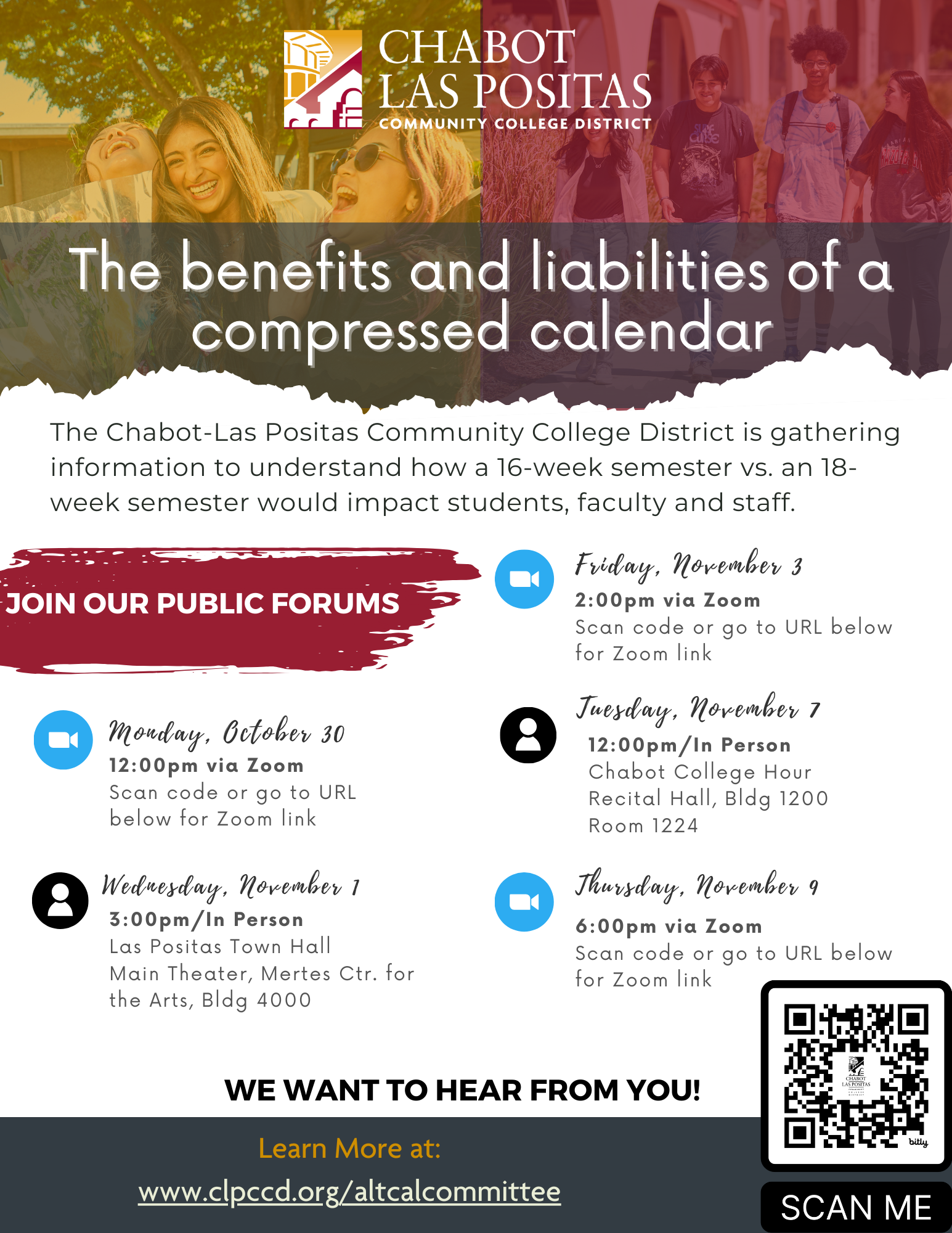Alternative Academic Calendar Committee
Alternative Academic Calendar Committee (AACC)
On March 1, 2024, a majority of the 18-member Alternative Academic Calendar Committee recommended a suspension of further steps towards consideration of a compressed calendar at this time. The committee's discussion leading up to the recommendation highlighted concerns and impacts in the following areas: students and student success, the SCFF metric (budget), transition to a compressed calendar, workload, facilities, technology, and classified professionals representation.
On March 5, Chancellor Gerhard provided the following response:
Dear Members of the Alternative Academic Calendar Committee,
I hope this message finds you well. You have my sincerest gratitude for the dedication
and effort you have invested over the past 15 months in meticulously evaluating the
potential benefits and drawbacks of a compressed academic calendar for our district.
I am in receipt of your final recommendation and have reviewed all of your meeting
minutes and related evidence gathered. It is clear that the decision-making process
was based upon a profound understanding of the educational landscape, as well as a
careful consideration of the pros and cons associated with a transition to a compressed
academic calendar.
Respecting the time, expertise, and comprehensive research conducted by the committee, I wholeheartedly accept your recommendation to suspend moving forward with the transition to a compressed academic calendar at this time. It is evident that this decision was not made lightly and reflects a thoughtful consideration of what is best for our district at this time.
I look forward to the opportunity to work together in the future as we continue to explore and implement initiatives that advance the educational experiences and outcomes of our students.
Thank you once again for your outstanding contribution and dedication.
The AACC has concluded its work. The co-chairs of the AACC, Theresa and Jason, would like to thank all the members for their hard work over the last 15 months.
In Fall 2022, pursuant to Article 8D of the Faculty Agreement, an Alternative Academic Calendar Committee (AACC) was formed "to examine in detail the benefits and liabilities involved with any modification to the standard seventeen and a half (17.5) week semester Primary Term:'
AACC members were appointed by the District/Colleges and the Faculty Association, and were carefully selected to represent key stakeholder groups, contribute expertise, and ensure consistent and committed participation. Co-chairs Vice Chancellor Theresa Fleischer Rowland and Chabot College faculty member Jason Ames were appointed to manage the work of the committee, which was supported by a district-contracted professional expert, John Mullen.
A series of open meetings of the AACC were held using Zoom technology beginning in December 2022 and continuing until the final (in-person) AACC meeting held on March 1, 2024. The cochairs promoted a clear itinerary of topics and meeting access information in order that connected, concerned, and involved individuals from throughout the District could attend the meetings. Resource experts from across the Colleges and District were included throughout the process. In-person forums, online surveys of employees and students, and student focus group discussions informed the AACC of the opinions of all stakeholder groups.
A key theme pervaded all discussions and deliberations of the AACC. "What is in the best interest of our students?" was asked at every turn. Although the potential effects of an academic calendar change on faculty, classified professionals, and administrative procedures were examined and discussed in great detail, the guiding principle throughout the committee's deliberations was to ensure that its recommendation with respect to pursuing a calendar change was based on what is best for the students.
On March 1, 2024, a majority of the 18-member Alternative Academic Calendar Committee recommended to Chancellor Gerhard "a suspension of further steps towards consideration of a compressed calendar at this time. The committee's discussion leading up to the recommendation highlighted concerns and impacts in the following areas: students and student success, the SCFF metric (budget), transition to a compressed calendar, workload, facilities, technology, and classified professionals representation:'
In response to the AACC's recommendation, Chancellor Gerhard expressed his sincere gratitude for the committee's work, writing, in part:
I am in receipt of your final recommendation and have reviewed all of your meeting minutes and related evidence gathered. It is clear that the decision-making process was based upon a profound understanding of the educational landscape, as well as a careful consideration of the pros and cons associated with a transition to a compressed academic calendar.
Respecting the time, expertise, and comprehensive research conducted by the committee, I wholeheartedly accept your recommendation to suspend moving forward with the transition to a compressed academic calendar at this time. It is evident that this decision was not made lightly and reflects a thoughtful consideration of what is best for our district at this time.
Detailed Information about the work of the Alternative Academic Calendar Committee can be found on the pages of this website.

